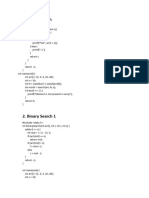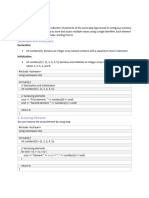0% found this document useful (0 votes)
35 views5 pagesSorting Techniques Explained
The document discusses various sorting algorithms and methods for sorting arrays and strings in C/C++. It explains how to use the STL sort function to sort integers, characters, and strings in both increasing and decreasing order. Custom comparators are described that allow sorting in different orders. Built-in comparators like less<> and greater<> or a custom comparator function can be passed to sort.
Uploaded by
Toğrul QuluzadəCopyright
© © All Rights Reserved
We take content rights seriously. If you suspect this is your content, claim it here.
Available Formats
Download as PDF, TXT or read online on Scribd
0% found this document useful (0 votes)
35 views5 pagesSorting Techniques Explained
The document discusses various sorting algorithms and methods for sorting arrays and strings in C/C++. It explains how to use the STL sort function to sort integers, characters, and strings in both increasing and decreasing order. Custom comparators are described that allow sorting in different orders. Built-in comparators like less<> and greater<> or a custom comparator function can be passed to sort.
Uploaded by
Toğrul QuluzadəCopyright
© © All Rights Reserved
We take content rights seriously. If you suspect this is your content, claim it here.
Available Formats
Download as PDF, TXT or read online on Scribd
/ 5































































































